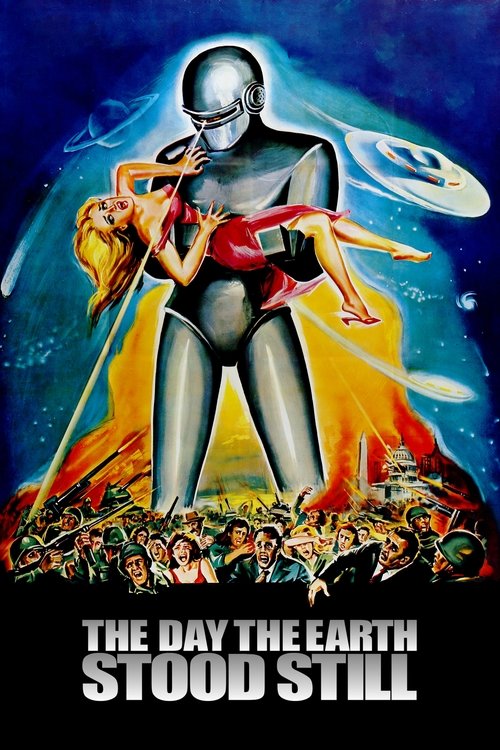
Title: The Day the Earth Stood Still
Year: 1951
Director: Robert Wise
Writer: Edmund H. North
Cast: Michael Rennie (Klaatu, alias Mr. Carpenter),
Patricia Neal (Helen Benson),
Billy Gray (Bobby Benson),
Sam Jaffe (Prof. Jacob Barnhardt),
Hugh Marlowe (Tom Stevens),
Runtime: 92 min.
Synopsis: An alien and a robot land on Earth after World War II and tell mankind to be peaceful or face destruction.
Rating: 7.5/10
A Celestial Warning in Black and White: The Enduring Power of The Day the Earth Stood Still
/10
Posted on July 25, 2025
Robert Wise’s The Day the Earth Stood Still (1951) remains a haunting beacon of science fiction’s golden age, its understated elegance and moral urgency cutting through the era’s paranoia like a laser. The film’s brilliance lies not in spectacle but in its restraint, using minimalism to amplify its philosophical weight. Wise’s direction, lean and deliberate, transforms a modest budget into a virtue, crafting a world that feels both intimate and cosmic. The Washington, D.C. setting, captured in crisp black-and-white by cinematographer Leo Tover, grounds the extraterrestrial narrative in a tangible, almost documentary-like reality. Landmarks like the Lincoln Memorial and bustling streets contrast with the sleek, alien saucer, creating a visual tension that mirrors the film’s central conflict: humanity’s capacity for self-destruction versus its potential for redemption.
The screenplay, adapted by Edmund H. North from Harry Bates’ story, is a masterclass in economy, weaving a Cold War allegory without preaching. Klaatu (Michael Rennie), the alien emissary, is not a savior but a messenger, his calm dignity and subtle wit making his warnings about nuclear annihilation resonate. Rennie’s performance is magnetic yet restrained, his measured delivery “Your choice is simple: join us and live in peace, or pursue your present course and face obliteration” carrying a gravitas that lingers. Patricia Neal, as Helen Benson, complements him with quiet strength, her understated portrayal grounding the film’s emotional core. Their chemistry, though understated, humanizes the cosmic stakes.
However, the film stumbles in its supporting characters. The scientists and military figures often feel like archetypes, lacking the nuance of Klaatu or Helen. This flattens some dramatic moments, particularly in the second act, where the screenplay leans too heavily on expository dialogue to drive the plot. Bernard Herrmann’s score, while innovative with its use of theremins, occasionally overwhelms quieter scenes, tipping the mood toward melodrama. Yet these flaws pale against the film’s ambition. Its refusal to demonize any side neither humanity nor the alien enforcers challenges viewers to confront their own moral failings. In an era of McCarthyism and atomic dread, this was radical, and its call for global unity remains urgent. Wise’s film doesn’t dazzle with effects but pierces with ideas, proving that true science fiction speaks to the mind as much as the heart.
0
0
